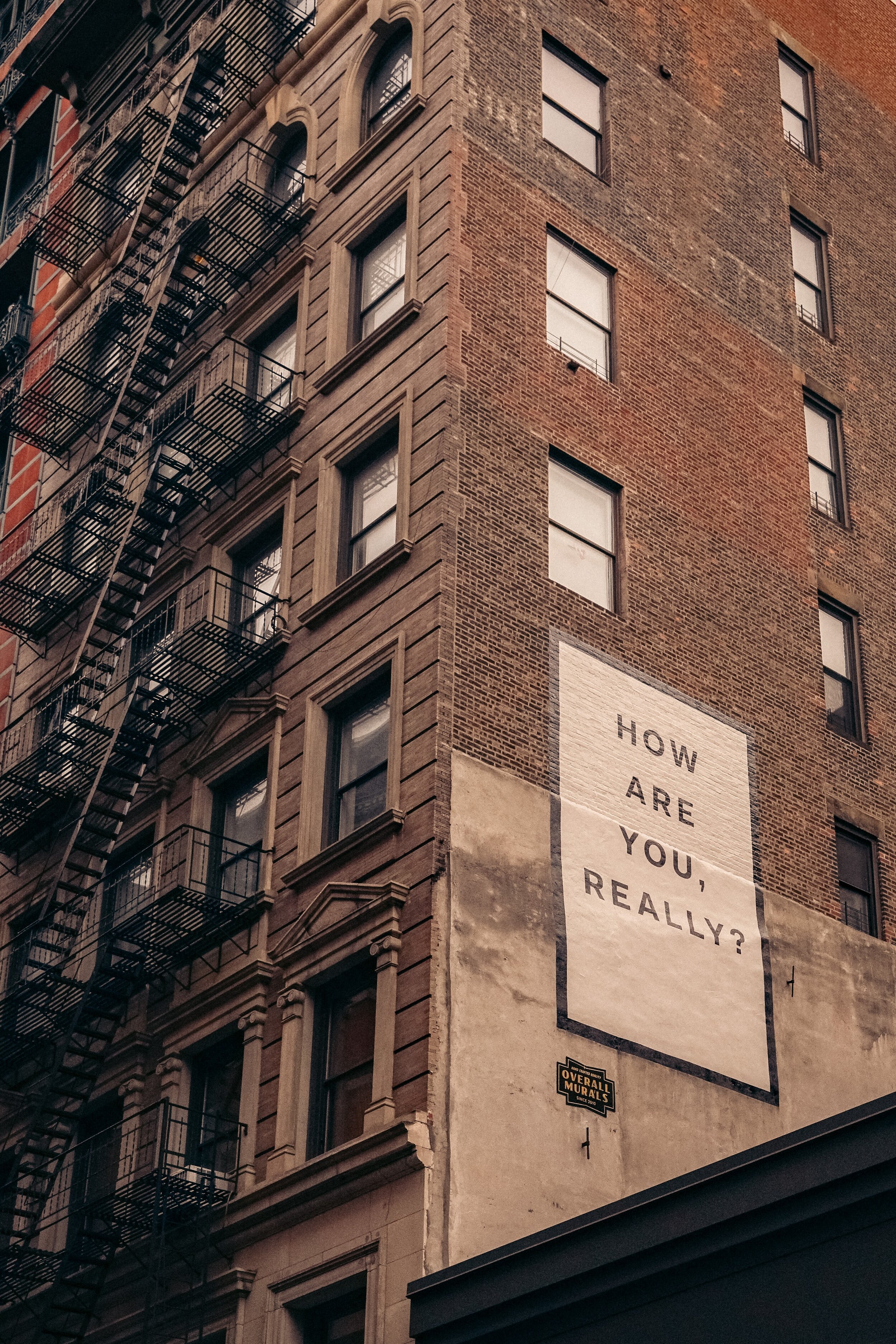You Can Get Through This: Mental Health Monthly
Author’s Note: Please note that I am not a mental health professional, and what I’ve written herein is not intended as a substitute for professional help. If you are feeling overwhelmed or lost, 60 Digital Resources for Mental Health may help you seek out professional resources to fit your specific needs.
Everyone’s mental health journey is different. For some, maintaining a positive well-being is as simple as “staying chill” with “good vibes only.” Others have to work hard just to get out of bed in the morning. And as I say that I wonder if people truly understand that, for some, it’s not always fatigue or lack of motivation that keeps them under the covers. It can go as deep as questioning if the day at hand is even worth living through.
But for me, mental health awareness is about laying it out there and saying, “This is what I go through. You might not understand it, but that doesn’t make it any less valid.” I don’t expect everyone to share their feelings the way that I do, and although I do it every day, it doesn’t always come easy. I find the courage to share my experiences, hoping to enlighten others about the overlooked, misunderstood and unapparent pain of those around them. And for those who experience that pain, I speak out to remind them they are not alone.
As a person diagnosed with anxiety and moderate OCD, my day is filled with thoughts and actions that may not make sense to you, but to me they feel like a matter of life and death. As a result of past trauma, Fear, insecurity, and unrealistic expectations have become the rulers of my existence. And so, I cope by doing everything in my power to control the situation, armed with a logic that may only make sense to me.
Usually it starts with a small, seemingly insignificant event, like finding a stray piece of thread on the carpet. A person without OCD might pick up that piece of thread, throw it in the trash and move on with their day. My way of coping would look something like this:
I see that thread and instantly I’m brought back to the day my beloved cat ate a piece of string out of my closet. After being told by my vet that ingesting string can result in fatal complications for cats, I rushed him to their office. Fortunately, that ended with him being perfectly fine.
That was almost four years ago. Now that I am aware of what could happen, a random piece of string on the floor sends me into a spiral of intense fear. “How long has that been there? Did he eat some of it? Where is he right now? Why wasn’t I watching him? How did I not see this? What’s going to happen? Why wasn’t I better at keeping the house clean?” I might walk around the house to investigate. Finding a possible source of the thread means more investigation. Was it long enough to hurt him if he did ingest it? If I don’t find the source of the string, I’ll either keep it for a future session of investigation or I will eventually throw it away.
And when I do throw it away, I focus on the piece of string as it goes into the trash to make sure that it actually went in. I might even go back and check a few times just to be sure that what I saw was true. A few days later when it is abundantly clear that my cat is fine, I’ll finally allow the incident to leave my mind. I’ll do what I can to prevent a moment like that from ever happening by vacuuming the entire apartment every day and checking the floor periodically throughout the day. And that is just one example of how I deal with triggering moments in my life. And if I don’t do these “comforting actions,” it feels as though I am suffocating.
If reading that series of actions was exhausting for you, imagine what it’s like to have to do routines like this every single week. Not because I want to, but because some days it feels like it’s the only way to quiet my mind. In reality, performing these routines is like pouring gas onto a fire with the hopes of putting it out. It never works and just gets bigger and bigger.
Even as I write this, knowing that it’s my own reality that I live in every day, it still feels unbelievable. I tell people I have OCD and often hear about how they also like to “keep things organized and tidy” as if that’s all it is. But for me, keeping organized and tidy are symptoms of a desperate need for control over my anxiety and tidiness is not the only facet of my OCD. Each moment of my life must be perfectly calculated in order for me to keep my head above water. “What If?” is tattooed on my mind with every step I take. I am so terrified of the consequences of any mistake. Nine times out of ten those mistakes are ones I have created out of thin air based on no fact at all. I could do something as tiny as touching a flower and find my way to how it might send me to the hospital. With thoughts like those constantly finding their way into my head, some days it just doesn’t seem worth it to get out of bed in the morning.
So, what keeps me going? How do I get anything done in life while also navigating these thoughts every day? I don’t do it alone.
Above everything else, I have a fantastic therapist who specializes in OCD. She’s helped me understand it and is teaching me ways to control and lessen my need for OCD rituals. She is helping me spot moments in my day when I’m getting anxious and ready to go down a path of rituals and giving me tactics to help redirect my thinking. She was able to put a name to what I deal with. She validates my emotions. She gave me hope and safety by helping me realize that my emotions, while overwhelming and real, are also manageable with hard work and the willingness to face the fear. And the work is hard. But it’s worth it. And as I leave her sessions and go into the world to do my mental health work, I am still not alone. I’ve surrounded myself with people who not only support and care about me, but are also patient with me. Though they might not fully understand it or experience it themselves, they see that my fear and my pain is real. They help remind me that it can get better and that it has gotten better. I’ve been working on my mental health for years and even though I have a long way to go, I’m able to look back and see progress happening within myself every single day. And that progress would not have been possible without people in my life who understand the importance of mental health.
If you are someone who doesn’t identify with anxiety or depression or any number of mental health issues out there, the best way that you can practice mental health awareness is simply being aware of its existence. Just because it’s not happening to you, or because you don’t understand it, doesn’t mean it isn’t real. Mental health issues are not something people choose to have or can just turn off. If someone you know shares with you that they are struggling, let them be heard. And for those reading this who may be struggling, please remember that you are not alone. Even if you are physically alone as you read this right now, remember that you are reading the words of another person who knows that mental health is real and important. Your people are out there and there is support for you. Reach out and ask for help. It may not be easy, admitting you need help, asking for it, or doing the work to find your balance in life, but I can tell you from where I was, where I am now and from knowing where I’m going, it truly is worth it.
I want to offer a few affirmations that might offer comfort on the tougher days for those who struggle with their mental health:
· My emotions are valid and important
· I am not alone in what I am feeling
· Navigating this moment may not be easy, but I can get through it
· I am strong
· Getting help does not invalidate my strength
· I matter and I deserve to take up space in this world
And for those who may not struggle quite as severely, I want to offer a few reminders:
· Just because it’s not happening to you, doesn’t make it unimportant
· Just because you don’t understand it, doesn’t mean it’s any less real
· You don’t know their whole story
· Kindness and patience can go a long way
· Sometimes it is more important to listen that to be heard
And here are a few things for everyone to check out that might validate your emotions or help you to understand the emotions of others:
Listen
Who Knows? Podcast-This podcast, and all the work that I do at Who Knows? , is my way of sharing my story and dedicating my life to mental health advocacy. On the podcast, my guests share their stories and how they deal with their own mental health struggles in many facets of life.
Next to Normal Musical Soundtrack-Next to Normal is the story of a woman severely struggling with mental illness and how that struggle affects her family. This show is a perfect display of all sides of the spectrum of mental health. Those in the trenches and on the sidelines trying to help. The music digs deep into what it’s like to live inside your head while others struggle to understand. “I Am The One” makes me cry every single time.
BTS- BTS is not just seven guys dancing to catchy tunes, their songs have a much deeper intended meaning that comes from the group caring about their own mental health and the mental health of others. They are unafraid to show their emotions and vulnerability in their music and use that courage to show others that they can do the same in their own life.
Watch
The Unites States of Tara- This dark comedy is a severely underrated show about mental health. The mother figure of this show battles with dissociative identity disorder and her family must be prepared for anything and she shifts between multiple versions of herself.
Pixar’s Inside Out- This movie is a simple yet powerful display of how our emotions interact with one another and what can happen if we deny ourselves the ability to feel the range of emotions that we need to feel for the better of our emotional health.
Black Swan- This is a truly terrifying display of the dangers of unrealistic expectations and the need to be perfect. Natalie Portman’s character puts herself through torture and severe mental anguish for her career while pretending that she is fine. This is not unlike many who move through the world silently suffering in their own way.
Reminder that these are all movies based in fiction that depict themes of mental illness, but a true experience of these illnesses can look different in real life and are different for everyone who experiences them.
Read
Turtles All the Way Down by John Green- An example of the struggles of obsessive-compulsive disorder through the lens of a teenage mystery story.
The Color of Hope: People of Color Mental Health Narratives By Vanessa Hazzard- People of color from all walks of life share their stories to help break the stigma surrounding mental health and bring forward the often-forgotten emotions being felt in communities of color.
What is mental health? Written by Adam Felman -Sometimes it’s good to just start with the basics. This article from Medical News Today will inform you simply of what mental health is and why it is important in every part of our lives. There is even a breakdown of some of the common mental health disorders and links to dive deeper into each of them.




